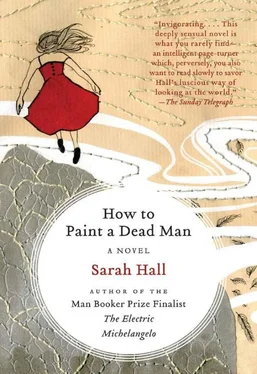Sarah Hall - How to Paint a Dead Man
Здесь есть возможность читать онлайн «Sarah Hall - How to Paint a Dead Man» весь текст электронной книги совершенно бесплатно (целиком полную версию без сокращений). В некоторых случаях можно слушать аудио, скачать через торрент в формате fb2 и присутствует краткое содержание. Год выпуска: 2009, Издательство: Harper Perennial, Жанр: Современная проза, на английском языке. Описание произведения, (предисловие) а так же отзывы посетителей доступны на портале библиотеки ЛибКат.
- Название:How to Paint a Dead Man
- Автор:
- Издательство:Harper Perennial
- Жанр:
- Год:2009
- ISBN:нет данных
- Рейтинг книги:4 / 5. Голосов: 1
-
Избранное:Добавить в избранное
- Отзывы:
-
Ваша оценка:
- 80
- 1
- 2
- 3
- 4
- 5
How to Paint a Dead Man: краткое содержание, описание и аннотация
Предлагаем к чтению аннотацию, описание, краткое содержание или предисловие (зависит от того, что написал сам автор книги «How to Paint a Dead Man»). Если вы не нашли необходимую информацию о книге — напишите в комментариях, мы постараемся отыскать её.
, Sarah Hall, "one of the most significant and exciting of Britain's young novelists" (
), delivers "a maddeningly enticing read... an amazing feat of literary engineering" (
).
How to Paint a Dead Man — читать онлайн бесплатно полную книгу (весь текст) целиком
Ниже представлен текст книги, разбитый по страницам. Система сохранения места последней прочитанной страницы, позволяет с удобством читать онлайн бесплатно книгу «How to Paint a Dead Man», без необходимости каждый раз заново искать на чём Вы остановились. Поставьте закладку, и сможете в любой момент перейти на страницу, на которой закончили чтение.
Интервал:
Закладка:
Annette would like to take hold of Uncle Marcello’s hand and hold it firmly. She has walked home in a state of high anxiety and she would like to feel his strong, soil-lined fingers linked through her own. Or her mother’s, or Mauri’s. She would like to describe the terrible feeling at the cimitero, and the feeling all the way down the steps and along the road, that something was creeping into her. Her heart is curled tight and will not stop quivering. She would like to tell them all that a shadow has touched her. It followed her, and even though she turned the corners in the town sharply, she could not leave it behind. It seemed to crawl up inside her, and deposit its matter, like an insect laying eggs. She would like somebody to go to the window and tell her if there is a black shape at the edge of the courtyard. Perhaps, at first glance, a man dressed suitably for handling the body of the dead Christ, then, on closer examination, a man with horned cheekbones and a dog’s mouth, running with bile. But her uncle is talking excitedly about the purchase of the television, and the family are talking to each other and over each other about it. ‘Rosaria, this will be good for us all. We can play the quiz shows together. Tommaso will have Carosello before bed. And with any luck the Pope will give us a Western. Put it there in the corner, Mauri, move the table away from the wall.’
Annette slips towards her mother and reaches for her hand. But her mother seems too agitated, busy with the problems of the television and the rearrangement of the furniture, and she shakes her hand free. ‘Be more careful, Mauri! You’re going to smash something.’ He groans. ‘It weighs a ton! It’s made of concrete!’ Annette stands close to Tommaso. He is wrapped in a blanket and smells of camphor. He rests his head against her arm and she kisses his hair.
Once the television has been positioned and wired they switch it on. Uncle Marcello fusses over the settings, adjusts the dials and the aerial, and finally a rapid, trilling voice can be heard, carried on a flush of static. Then there is the pounding of surf. ‘Aaaah,’ they all say. Uncle Marcello claps his hands together. ‘It is the Pacific Ocean! Look — they’re surfing!’ Mauri clicks his fingers and begins to sing an American song. ‘OK. We need some rules,’ Annette’s mother says, ‘about how long we will watch, and when we will watch, and what is suitable to watch.’ There are groans from the boys and Annette hears Tommaso blowing his tongue. ‘Yes! We must limit our viewing to twenty minutes a day maximum, I think.’ Her tone is firm, but she sounds pleased. Uncle Marcello snorts. ‘Excuse me, let us see who the Stalinists among us really are by the end of the week.’ Tommaso drops his blanket and Annette hears tussling and giggling. ‘Netta, I’m riding Mauri,’ he shouts. ‘I’m surfing.’
And Annette knows, at this moment, that they cannot help her. They will not believe she has been touched somehow by the Bestia, and if she tells them a violation has occurred they will ask who else it was that did it, they will demand a name. She has no evidence. There is no stain against her skin, no wicked print soiling her dress, darkening her breast, for it would have been pointed out when she arrived home and the wire brush would have been taken to the mark. She cannot give them her word and ask to be forgiven. She will simply have to wear the impurity on the inside.
One by one her family take to the chairs. The television talks and hums, hums and talks, like an old aunt. Annette reaches for the table, to memorise its new position. After a while she sits beside the set and puts her hands on the casing of the garrulous new guest. It is a box, bigger than the radio, smaller than the oven. The screen bulges outwards, like a hard bubble. There is a little crackle as her fingers track over the glass, as if she has disrupted a strange hive. The carapace feels warm against her palms. ‘Try not to dirty the screen, Annette,’ her mother calls. ‘I don’t want to clean fingerprints off it every day.’
After the programme about the Pacific, Uncle Marcello sits Annette on his knee and explains the elements and workings and contents of the television set, as he would the tiny filaments of a flower under the microscope. She sits crookedly across his legs. She is too big now to balance there properly. ‘This is what the social revolution has led us to,’ he says with a chuckle, ‘audiovisual propaganda, Vatican censorship, football and fashions on Sunday. It’s not real.’
‘Uncle Marcello,’ she begins. ‘Do you think we might be inside something like a television too? Can other people look in to see what we are doing all the time? How do we know what is real outside?’
‘Ah, little one,’ he says, squeezing her waist. ‘I think you have more brains than the rest of us. It is an interesting philosophical question — we should speak to Kant. Perhaps he would say that nothing is real unless…’ From the corner armchair, Annette’s mother’s voice chimes in to the discussion. ‘That’s quite enough. Tell her the truth, Marcello. God is the only one outside. God can see everything we do. God is always watching. That is the reality and the truth of the matter.’ Uncle Marcello opens his legs and gently lowers Annette to the floor between them. His trousers smell musty, of vegetable roots and nutshells.
For the rest of the afternoon and into the evening the television is kept on, conducting its own theatre, talking and flickering, a mind warming in its shell. No perfume drifts from it, and it emanates no moods. The noises it makes are strangely remote and complete within themselves. And yet it seems to be casting a spell; her family is transfixed. They carry their dinner bowls to their chairs instead of eating outside at the table in the courtyard. ‘For tonight only,’ her mother says. ‘It’s just a novelty.’ Their conversation loops around the conversation of the television. They talk about what it talks about. It is as if a dominant old relative is holding court in the living room, and they are all agreeing with everything she says. No, it is like a politician, like the mayor. Annette wonders what its capabilities are, whether it can recognise the scent of the roses it shows her family, or taste the beans it advertises. At times, high-pitched voltage escapes from the appliance, so elevated and intense it is almost celestial, but quite painful. Annette can feel her ears drums vibrating, and then she must get up and leave the room. She hears her mother worrying. ‘Is it jumping too much, Marcello? Does it need to be re-tuned? Attend to it or we will all become cross-eyed.’
That night, as they prepare to go to bed, her mother covers the television with her special embroidered cloth, as if it is an antique armoire or a Chinese vase, as if they will presently be leaving the house for an extended season by the sea.
Later, Annette wakes to hear strange sounds. For a second she is filled with irrational fear. But it passes, and her heart slows. There are murmurs and footsteps. Someone is in the kitchen, perhaps getting a glass of water, and talking half in their sleep. If it is her little brother, if a bad dream has disturbed him, making him hot and panicky, he will need to be tucked back under his quilt and soothed. She sits up in bed, reaches for the handle of the door and opens it a fraction. Two voices are in intense and quiet discussion a few rooms away — not in discussion exactly, but certainly they are communicating. There are soft groans and whispers, which seem to imply questions asked and replies given, words in a language she cannot understand. ‘Nah…ohf…coh…’
She turns back the covers, wraps her shawl around her shoulders, and goes into the hall. She pauses. The sounds are a little louder now, but still indistinguishable. There is a deep tone and a lighter tone. Now and then she can recognise a phrase: ‘…wait for…want to…oh…and beautiful…’ She wonders if someone has forgotten to turn off the television. Perhaps the button has not been pressed firmly enough, or it needs to be unplugged from the wall. There is snapping and rustling, a hum like the hum of someone enjoying a mouthful of food, a grunt, and a scuff. Then, a bad word, which she has only ever heard Mauri and the men at the pork van use. A voice cries out, ‘No!’ Annette opens the door of the living room. Uncle Marcello calls from inside, ‘Hey. Who’s that?’
Читать дальшеИнтервал:
Закладка:
Похожие книги на «How to Paint a Dead Man»
Представляем Вашему вниманию похожие книги на «How to Paint a Dead Man» списком для выбора. Мы отобрали схожую по названию и смыслу литературу в надежде предоставить читателям больше вариантов отыскать новые, интересные, ещё непрочитанные произведения.
Обсуждение, отзывы о книге «How to Paint a Dead Man» и просто собственные мнения читателей. Оставьте ваши комментарии, напишите, что Вы думаете о произведении, его смысле или главных героях. Укажите что конкретно понравилось, а что нет, и почему Вы так считаете.












